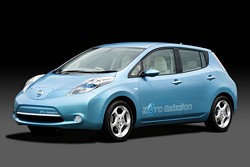The next trend in automobiles comes with a jolt ...
It's the electric car — back and more viable than ever. From the Nissan Leaf to the Chevrolet Volt or modifications made to the gas-burning car in your driveway, getting around is getting greener. But is this emerging wave of vehicles impacting the Q.C. in a big way? Here's a quick rundown:
Turning over a new Leaf
The Nissan Leaf is the all-electric car that can go 100 miles on a full charge; the actual mileage depends on driving conditions and whether you're doing highway or city driving. It comes in two models: the SV (which is your standard vehicle) and the SL (which comes with a quick-charging port that allows the driver to charge the battery at a faster pace); it takes about four to eight hours to fully charge the Leaf.
The MSRP of the Leaf is about $32,780 for the SV and $33,600 for the SL, but a tax incentive of up to $7,500 is available. To purchase a Leaf, however, you can't just go to your local Nissan dealership and pick one out; you have to order it on the Nissan website, www.nissanusa.com/leaf-electric-car. Starting May 1, residents of North and South Carolina will be able to order the auto.
When new reservations open up next month, the process to build and ship the car is expected to take between three and six months.
A shocking Volt
While you can go to a Chevrolet dealership and pick up the all-electric Volt, you can't do it in Charlotte ... yet.
According to Chevrolet, the company targeted seven launch markets for the vehicle: Texas, New York, California, New Jersey, Connecticut, Michigan and Washington, D.C. At the end of the year, there are plans to expand to more markets. So, if really want you want one, you just have to travel to a dealership in one of the launch states.
Here's what you'd be getting, according to the Chevrolet website, (www.chevrolet.com/volt): The Volt has a small, quiet, on-board gas generator, which creates electricity that powers your Volt as you drive for hundreds of miles on battery and gas power. The Volt fully charges in about 10 hours, depending on climate, with a standard 120-volt line — or in as little as four hours using a dedicated 240-volt line.
The Lithium-ion cells outperform nickel metal hydride cells (found in today's hybrids) in terms of life cycle and a liquid thermal cooling and heating system keeps the battery at a comfortable temperature as it's being charged and discharged. When running on electricity, the Volt can reach a top speed of 100 mph in near silence, and it costs about $32,780.
Tweaking the one you love
Maybe purchasing a new electric car isn't in your budget, but cutting down on emissions is close to your heart. Then you can transform your car from a gas-guzzler to electric — or even a cleaner-fuel burner. Mark Englander, the owner of Charlotte Energy Solutions, knows just what drivers need to make their cars more environmentally friendly. According to Englander, his company can convert the Prius (the popular hybrid car) into a totally electric car. "We put an extra battery pack into the Prius and it allows you to get 100 miles on just an electric charge," he said. After tax incentives, it costs about $1,000 to make a Prius all-electric. In addition to that, Englander can also transform a regular car into a fully electric car by wiping out the interior, removing the motor and replacing it with electric parts.
Beyond electric, over the last four years, Charlotte Energy Solutions has converted about 100 vehicles from gas-burning to vegetable-oil-burning. In order for this to work on an engine, it has to be a diesel engine. "The original diesel fuel was peanut oil, so it's not a new technology. It's old technology," Englander said. "The new technology is all the heaters and filters that we use." In the winter, especially, the oil heaters are vital to the car's ability to process the oil. Vegetable oil is thicker than gas, and it has to be heated to run through the engine properly.
It runs between $600 and $3,000 to convert a diesel engine into a vegetable-oil-burning car. Englander said the price varies based on the extras the driver wants. "Then, you're basically driving for free," he said.
For more information, visit www.charlotteenergysolutions.com.
2nd Annual Transportation Issue Part II of III
Braking up is hard to do ... one year later
Meet the 'Car Foes'
It's electric (cars)
Listen while you (drive to) work
Latest in Transportation Issue 2011, Part 2
More by Cheris Hodges
-

Statewide film series set to fight N.C. anti-gay amendment
Dec 15, 2011 -

N.C. governor vetoes repeal of Racial Justice Act
Dec 14, 2011 -
More Democratic in-fighting
Dec 13, 2011 - More »
-
Freedom Crawlspace Services: Charlotte's Premier Crawl Space Contractor, Paving the Way in Moisture Control and Mold Prevention
-
Elite Air and Heat LLC: The Premier 24/7 HVAC Contractor in Rock Hill, SC, Setting the Standard for Excellence in York County
-
Carolina Exterior Shades Unveils Cutting-Edge Outdoor Shades and Patio Installations in Charlotte, NC










